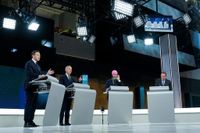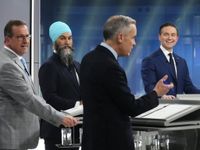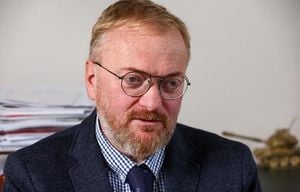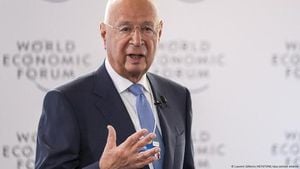MONTREAL — The English language leaders' debate got underway in Montreal at 7 p.m. EDT on April 17, 2025. This marked the second of two national debates featuring the main party leaders: Liberal Leader Mark Carney, Conservative Leader Pierre Poilievre, NDP Leader Jagmeet Singh, and Bloc Québécois Leader Yves-François Blanchet. The previous evening, the French debate took place, setting the stage for a heated exchange of ideas and policies.
As the debate commenced, the atmosphere was charged with anticipation, and each leader prepared to tackle pressing issues. The topics for the evening included affordability, energy and climate, public safety and security, and the ongoing crisis stemming from international relations, particularly with the United States.
By 9 p.m., the debate concluded, but not without moments of tension and confrontation. Poilievre, in a passionate exchange, stated that he was born to a single mother and adopted by schoolteachers, which shaped his belief in the Canadian promise. “That promise feels broken today,” he declared, emphasizing the need for a renewed sense of hope in Canada.
Blanchet, representing Quebec's interests, asserted that Quebecers are distinct from other Canadians but can still be economic partners. “Let’s have a voice chosen by and for Quebecers,” he urged, highlighting the importance of regional representation in the face of challenges like the Trump administration.
Carney, in his closing remarks, painted a dire picture of the current situation in Canada, stating, “Canada is facing the biggest crisis of our lifetimes.” He accused the United States of attempting to undermine Canada’s sovereignty and pledged to stand firm against Donald Trump’s policies.
Singh, on the other hand, reminded the audience of the NDP's achievements, claiming that their MPs have successfully brought in dental care and pharmacare. He promised to continue fighting for the values that make Canadians proud, emphasizing social welfare and public health.
During the debate, leaders were asked to share their biggest regrets from the campaign. Blanchet expressed a desire for earlier collaboration among leaders to foster a partnership that could better address the challenges posed by Trump. Singh and Carney echoed similar sentiments, wishing they had more opportunities to connect with voters.
In a pointed exchange, Poilievre challenged Carney to apologize for the Liberal government's inflationary policies, which he insisted have hurt many Canadians. Carney countered that inflation was under two percent during his tenure as governor of the Bank of Canada, suggesting that the current economic climate is not solely the result of his previous role.
Singh took the opportunity to confront Carney on his ties to Brookfield, labeling it “one of the biggest tax dodgers in Canada” and questioning why he would support tax cuts for the wealthy while neglecting the needs of ordinary citizens. Carney defended his record, asserting that his private sector experience equips him to lead effectively during a crisis.
As the debate progressed, the leaders tackled Canada's role in the Middle East crisis. Poilievre asserted that Hamas and its sponsors in Iran must be defeated, while Singh condemned the treatment of Palestinians in Gaza, calling it “disgusting” and labeling the situation a “genocide.” Carney advocated for international collaboration to achieve a ceasefire and establish a viable Palestinian state alongside Israel.
Blanchet posed a critical question to Carney regarding his willingness to collaborate with other parties if he fails to secure a majority government. Carney responded affirmatively, indicating his readiness to work with provinces, labor groups, and Indigenous leaders.
On the topic of national security, Poilievre emphasized the need for Canada to support Ukraine against ongoing threats, while Blanchet insisted that Canada must also consider the humanitarian needs of civilians in Gaza. Carney echoed the call for continued support for Ukraine, highlighting the importance of maintaining alliances with international partners.
As discussions shifted to energy and climate change, Singh stressed the urgency of addressing the climate crisis. Poilievre advocated for natural gas projects that could help reduce emissions abroad, while Carney called for identifying national interest projects that include Indigenous partners from the outset.
When asked about the biggest security threats facing Canada, Poilievre cited rampant crime, while Carney pointed to China as a significant concern. Singh highlighted illegal guns and drugs crossing the border, and Blanchet noted the dependency of both Quebec and Canada on the United States.
Poilievre faced scrutiny over his proposal to use the notwithstanding clause to impose consecutive sentences on multiple murderers. He asserted his commitment to upholding the Charter rights of Canadians, while Carney argued that such measures could set a dangerous precedent.
Throughout the evening, Blanchet and Singh united in their criticism of Carney, questioning his past decisions and policies. Blanchet quipped that Carney’s approach seemed inconsistent, saying, “Mr. Carney, you are becoming a real Canadian leader, saying one thing in French and another in English.”
As the debate drew to a close, Carney attempted to shift the focus back to Poilievre, questioning his lack of security clearance, which would allow him to be fully briefed on national threats. Poilievre defended his position, claiming that obtaining the clearance would limit his ability to speak freely.
The political landscape in Canada has shifted significantly since the resignation of former Prime Minister Justin Trudeau and the return of Donald Trump to the White House. Recent polls indicate that Carney's Liberals have regained a slight lead over the Conservatives, with many Canadians viewing Carney as a viable alternative to Poilievre.
This debate was not only a critical moment in the election cycle but also a chance for the leaders to clarify their positions and appeal to voters ahead of the April 28 election. With advance voting beginning on April 18, the stakes are higher than ever as Canadians prepare to make their voices heard.






